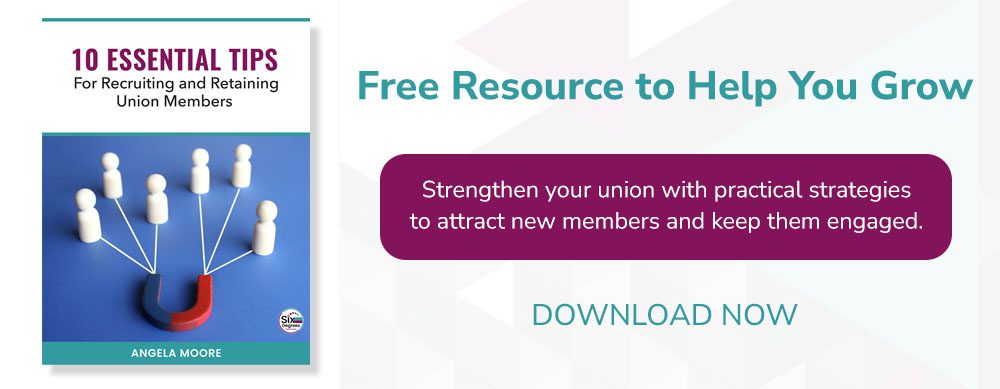Union stewards are the backbone of member support, acting as a direct line between leadership and workers. But even the most dedicated stewards can struggle with communication challenges. Information doesn’t always flow smoothly, misunderstandings arise, and members may feel disconnected from important union updates.
Without strong communication, engagement drops, misinformation spreads, and trust weakens. Members who don’t feel informed may hesitate to participate in meetings, actions, or negotiations, leaving stewards feeling like they’re constantly putting out fires rather than fostering a strong, united workplace.
The good news? Effective communication doesn’t have to be overwhelming. By using clear messaging, the right tools, and proactive strategies, union stewards can keep members informed, engaged, and ready to take action when it matters most. This guide outlines practical communication techniques that make information more accessible, increase participation, and ensure that stewards feel supported in their roles.
The Role of a Union Steward in Communication
Union stewards are more than messengers. They are advocates, educators, and problem-solvers who bridge the gap between leadership and members. Their ability to communicate clearly and consistently can shape how engaged and informed members feel about their union.
But communication isn’t always easy. Stewards often juggle their union responsibilities alongside full-time jobs, making it tough to stay on top of updates and questions. Some members may be disengaged or hesitant to participate, while others may feel overwhelmed by complex contract details or union processes. Without a clear strategy, important messages can get lost, leading to confusion, frustration, or even misinformation.
Strong communication builds trust, encourages participation, and ensures that members stay informed about key issues, from contract negotiations to workplace rights. When stewards communicate effectively, members feel empowered, which strengthens the union as a whole.
Key Communication Strategies
for Union Stewards
Being an effective union steward means staying ahead of the curve. Instead of waiting for members to come to you with concerns, proactive communication ensures they are always informed and engaged. When members feel like they only hear from their union during contract negotiations or workplace disputes, trust and participation can fade. Regular updates, even when there’s no urgent issue, help build a culture of transparency and involvement.
Reaching members requires more than one approach. Some prefer email, while others engage more through text messages, social media, or in-person meetings. Using multiple channels increases the likelihood that important information gets seen and understood. A quick text reminder about an upcoming meeting, an engaging post on social media, or a face-to-face check-in can go a long way in keeping members connected.
Clarity is key. Union matters can be complex, but that doesn’t mean communication should be. Instead of sending a long, dense contract update, break it down into short summaries with key takeaways. Use simple language, bullet points, and visuals when possible. If members don’t understand the information, they won’t act on it.
Example: Instead of sending a lengthy email about a contract update, summarize it in three key points: what changed, how it affects members, and what action they need to take.
Handling Tough Conversations
& Member Concerns
Difficult conversations are inevitable in any union, but how they’re handled can make all the difference. Avoiding issues only allows frustration to grow, so it’s important to address concerns directly with honesty and transparency. Whether it’s about contract negotiations, workplace disputes, or union leadership decisions, members need clear, fact-based information to feel confident in their representation.
Listening is just as important as responding. When a member voices a concern, their first need isn’t always an immediate solution—it’s to feel heard. Practicing active listening by letting them fully express their concerns before responding helps build trust and shows that their input matters. Repeating back key points and acknowledging their frustration can go a long way in defusing tension.
Keeping conversations fact-based helps prevent misunderstandings and unnecessary conflict. When addressing issues, stewards should rely on union policies, contract agreements, and official updates rather than personal opinions or speculation. If a member is frustrated about the pace of contract negotiations, for example, a steward can provide clear context on the process, expected timelines, and any obstacles the bargaining team is facing. Providing updates with real information, even when the news isn’t ideal, reinforces credibility.
Digital Tools to Improve
Steward Communication
Strong communication isn’t just about what you say, but how you deliver it. With members juggling work, family, and other commitments, stewards need tools that ensure important updates don’t get lost in the noise. Using a mix of digital communication methods helps reach members where they are and keeps them engaged.
Text alerts are a great way to share quick, time-sensitive updates. Whether it’s a last-minute meeting change, an urgent bargaining update, or a reminder about an upcoming vote, a short text ensures members stay informed without having to check email or social media.
Email newsletters provide a more structured way to share key information. A well-organized newsletter can highlight recent wins, contract updates, upcoming events, and member spotlights, making it easier for members to stay connected.
Private social media groups offer a space for discussions, questions, and peer support. Platforms like Facebook or Slack allow members to connect in real time, ask questions, and stay engaged between official meetings.
Survey and feedback tools give stewards direct insight into what matters most to members. A quick online survey can help gauge concerns, gather opinions on key issues, and shape future communication efforts.
Moving Forward
Strong communication is the foundation of effective union stewardship. When stewards provide clear, timely, and engaging updates, members stay informed, feel supported, and are more likely to participate in union efforts.
Even small improvements in messaging can make a big impact. Whether it’s simplifying contract updates, using multiple communication channels, or improving how tough conversations are handled, better communication strengthens trust and union solidarity.
The right strategies and tools can empower stewards to communicate with confidence and keep members engaged. If you’re ready to refine your communication approach, let’s create a plan that works for your union. Schedule a call today.






